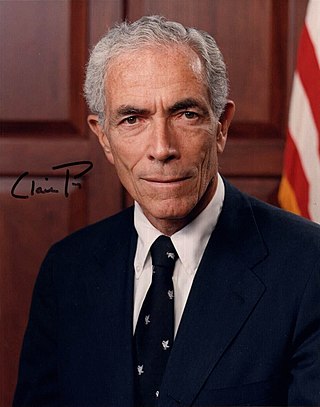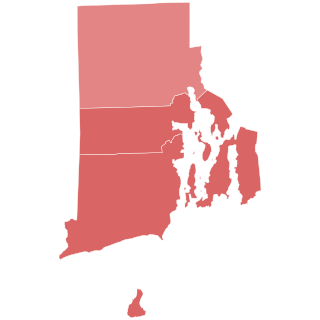
Claiborne de Borda Pell was an American politician and writer who served as a U.S. Senator from Rhode Island for six terms from 1961 to 1997. He was the sponsor of the 1972 bill that reformed the Basic Educational Opportunity Grant, which provides financial aid funding to American college students; the grant was given Pell's name in 1980 in honor of his work in education legislation.
Since the Great Depression, Rhode Island politics have been dominated by the Rhode Island Democratic Party, and the state is considered part of the Democrats' "Blue Wall." Democrats have won all but four presidential elections since 1928, with the exceptions being 1952, 1956, 1972, and 1984. The Rhode Island Republican Party, although virtually non-existent in the Rhode Island General Assembly, has remained competitive in gubernatorial elections, having won one as recently as 2006. Until 2014, Democrats had not won a gubernatorial election in the state since 1992, and it was not until 2018 that they won one by double digits. The Rhode Island General Assembly has continuously been under Democratic control since 1959.

The 1990 Rhode Island United States Senate election was held on November 6, 1990, to select the U.S. Senator from the state of Rhode Island. Democratic U.S. Senator Claiborne Pell decided to seek re-election and defeated Republican Representative Claudine Schneider in a landslide.

The 2000 United States Senate election in Rhode Island was held on November 7, 2000. Republican U.S. Senator John Chafee had announced in 1999 that he would not seek reelection, leading his son, Lincoln Chafee, to announce his own candidacy. The elder Chafee, however, died a few months later; his son was appointed to fill the remainder of the unexpired term. The younger Chafee, now the incumbent, sought a full term and won, defeating Democratic U.S. Representative Bob Weygand. As of 2024, this was the last congressional election in Rhode Island to be won by a Republican.

The 1996 United States Senate election in Rhode Island took place on November 5, 1996. Incumbent Democratic U.S. Senator Claiborne Pell decided to retire. Democratic nominee U.S. Representative Jack Reed won the open seat.

The 1960 United States Senate election in West Virginia was held on November 8, 1960. Incumbent Democratic U.S. Senator Jennings Randolph won re-election to a full term. Defeating Republican Governor Cecil H. Underwood in a landslide

The 2014 Rhode Island gubernatorial election took place on November 4, 2014, to elect the governor of Rhode Island, concurrently with the election of Rhode Island's Class II U.S. Senate seat, as well as other elections to the United States Senate in other states and elections to the United States House of Representatives and various state and local elections.

The 2014 United States Senate election in Rhode Island was held on November 4, 2014, to elect a member of the United States Senate from the State of Rhode Island, concurrently with the election of the governor of Rhode Island, as well as other elections to the United States Senate in other states and elections to the United States House of Representatives and various state and local elections.

The 1968 United States Senate election in Kansas took place on November 5, 1968, concurrently with the U.S. presidential election as well as other elections to the United States Senate in other states as well as elections to the United States House of Representatives and various state and local elections.

The 1984 United States Senate election in Rhode Island took place on November 6, 1984. Incumbent Democratic U.S. Senator Claiborne Pell successfully sought re-election, defeating Republican Barbara M. Leonard.

The 1978 United States Senate election in Rhode Island took place on November 7, 1978. Incumbent Democratic U.S. Senator Claiborne Pell successfully sought re-election, defeating Republican James G. Reynolds.

The 1972 United States Senate election in Rhode Island took place on November 7, 1972. Incumbent Democratic U.S. Senator Claiborne Pell successfully sought re-election, defeating Republican John Chafee in the closest race of Pell's Senate career. Chafee was elected to Rhode Island's other Senate seat in 1976, and was colleagues with Pell until the latter's retirement in 1996. This was the only United States Senate election in Rhode Island that Claiborne Pell won by a narrow margin and the only United States Senate election in Rhode Island in which Claiborne Pell did not carry every county or all counties in Rhode Island. Rhode Island was one of fifteen states alongside Alabama, Arkansas, Colorado, Delaware, Georgia, Iowa, Louisiana, Maine, Minnesota, Mississippi, Montana, New Hampshire, South Dakota and West Virginia that were won by Republican President Richard Nixon in 1972 that elected Democrats to the United States Senate.

The 1958 United States Senate election in Rhode Island took place on November 4, 1958. Incumbent Democratic U.S. Senator John Pastore successfully sought re-election, defeating Republican Bayard Ewing in a repeat of their 1952 race.

The 1952 United States Senate election in Rhode Island took place on November 4, 1952. Incumbent Democratic U.S. Senator John Pastore was re-elected to a second term in office.

The 1954 United States Senate election in Rhode Island took place on November 2, 1954. Incumbent Democratic U.S. Senator Theodore F. Green was re-elected to a fourth term in office.

The 1964 United States Senate election in Rhode Island took place on November 3, 1964. Incumbent Democratic U.S. Senator John Pastore successfully sought re-election, defeating Republican Ronald Lagueux with 82.73% of the vote.

The 1966 United States Senate election in Kansas took place on November 8, 1966, concurrently with elections to the United States Senate in other states as well as elections to the United States House of Representatives and various state and local elections.

The 1966 United States Senate election in Rhode Island took place on November 8, 1966. Incumbent Democratic U.S. Senator Claiborne Pell successfully sought re-election, defeating Republican Ruth M. Briggs with 67.66% of the vote.

The 1972 United States Senate election in New Hampshire took place on November 7, 1972. Incumbent Democratic Senator Thomas J. McIntyre won re-election to a third term. Democrats would not win this seat again until 2008. This was the first time Democrats were re-elected to any Senate seat in New Hampshire.

The 1972 United States Senate election in South Dakota took place on November 7, 1972, concurrently with the U.S. presidential election as well as other elections to the United States Senate in other states as well as elections to the United States House of Representatives and various state and local elections.





















